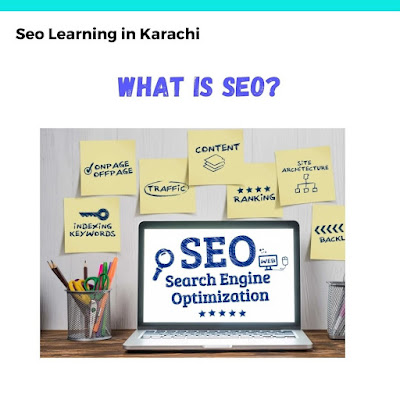SEO stands for Search Engine Optimization and it is the process of optimizing websites and content for better visibility in search engine results. SEO services include a variety of tactics such as keyword research, content optimization, link building, and more.
The goal of SEO is to increase website traffic from organic search results. A good SEO strategy can help businesses rank higher in search engine result pages (SERPs) and get more visibility online. It can also help businesses increase their brand awareness, reach new customers, and ultimately drive more sales.
SEO services are used to increase the ranking of a website or web page in search engine results pages (SERPs). It is an essential part of any digital marketing strategy, as it helps to drive organic traffic to your website. SEO can be done through various techniques such as keyword research, content optimization, link building, and more.
The best SEO companies offer comprehensive services that focus on improving the visibility and ranking of websites in SERPs. Local SEO services are also available for businesses targeting local customers, which involve optimizing their websites for local searches and setting up local business listings.
Finding the best SEO company can be a challenge as there are many options available in the market. However, you should look for one that offers local SEO services if you want to target customers in your local area.
How Search Engines Work?
Search engines are powerful tools that enable us to find the information we need easily and quickly. But how do they work? In order to understand the process of how search engines work, it is important to first understand the basics of SEO (Search Engine Optimization). SEO is a set of strategies used to improve the visibility and ranking of websites in search engine results. By optimizing content for specific keywords, websites can increase their chances of appearing at the top of search engine results pages (SERPs). With this in mind, let us dive into understanding how search engines work and what role SEO plays in this process.
What are basic fundamentals of Seo?
The basic fundamentals of SEO (search engine optimization) can be summarized as follows:
1. Relevant and Quality Content: Creating high-quality content that is relevant to your target audience and provides value. This includes incorporating relevant keywords naturally within the content.
2. Keyword Research: Conducting keyword research to identify the terms and phrases people use when searching for information related to your website. This helps you optimize your content and target the right keywords.
3. On-Page Optimization: Optimizing individual web pages by including relevant keywords in title tags, meta descriptions, headings, and content. It also involves optimizing URLs, image alt tags, and internal linking structure.
4. Site Structure and Navigation: Organizing your website in a logical and user-friendly manner. This includes creating a clear hierarchy, using descriptive and user-friendly URLs, and implementing proper navigation menus.
5. Mobile-Friendliness: Ensuring that your website is responsive and optimized for mobile devices. With the increasing use of smartphones and tablets, mobile-friendliness is crucial for user experience and search engine rankings.
6. Page Speed: Optimizing your website’s loading speed to provide a better user experience. This involves optimizing image sizes, minimizing code, leveraging browser caching, and using content delivery networks (CDNs).
7. Link Building: Acquiring high-quality backlinks from reputable websites. Backlinks act as endorsements and can improve your website's authority and visibility in search engine rankings. Focus on natural and relevant link building practices.
8. User Experience: Creating a positive user experience by ensuring easy navigation, clear calls-to-action, and a visually appealing design. User-friendly websites tend to have lower bounce rates and higher engagement, which can positively impact SEO.
9. Social Signals: Building a strong social media presence and engaging with your audience. Social signals, such as likes, shares, and comments, indirectly influence SEO by increasing brand visibility and driving traffic to your website.
10. Monitoring and Analysis: Regularly monitoring and analyzing website traffic, rankings, and other relevant metrics using tools like Google Analytics. This helps you understand the performance of your SEO efforts and make data-driven optimizations.
Remember that SEO is an ongoing process, and it’s important to keep up with industry trends, algorithm updates, and best practices to maintain and improve your website’s search engine visibility.
How Seo is Important for Websites?
Search Engine Optimization (SEO) is crucial for online businesses and websites for several reasons:
1. Increased Visibility: SEO helps your website rank higher in search engine results pages (SERPs), making it more visible to potential visitors. When your site appears on the first page of search results, you have a better chance of attracting organic traffic.
2. Targeted Traffic: SEO enables you to optimize your website for specific keywords and phrases that are relevant to your business. By targeting the right keywords, you can attract users who are actively searching for products or services like yours. This leads to more qualified traffic, increasing the likelihood of conversions.
3. Improved User Experience: SEO involves optimizing your website’s structure, navigation, and content to enhance the overall user experience. When users find your site easy to navigate and the information they seek is readily available, they are more likely to stay longer, explore more pages, and convert into customers.
4. Builds Trust and Credibility: High-ranking websites are often seen as more trustworthy and credible by users. When your website appears at the top of search results, it signals to users that search engines consider your site authoritative and relevant. This perception of trust and credibility can positively influence user behavior and increase conversion rates.
5. Cost-Effective Marketing: Compared to other digital marketing strategies, SEO offers a relatively low cost per acquisition. While initial SEO efforts require time and resources, organic traffic obtained through SEO is free. Long-term investments in SEO can provide sustained visibility and traffic, making it a cost-effective marketing channel.
6. Competitive Advantage: In today’s digital landscape, most businesses have an online presence. By implementing effective SEO strategies, you can outperform your competitors and capture a larger share of the online market. A higher search engine ranking can help you differentiate your business and attract more customers.
7. Long-Term Results: SEO is a long-term strategy that can provide lasting benefits. While it may take time to achieve higher rankings, the results can be more sustainable compared to paid advertising. With ongoing optimization efforts, you can maintain and improve your rankings, ensuring continued visibility and traffic to your website.
SEO plays a crucial role in increasing your website’s visibility, attracting targeted traffic, enhancing user experience, building trust and credibility, offering cost-effective marketing, providing a competitive advantage, and delivering long-term results for your online business.
How can you improve your website with Seo?
1. Keyword Research: Identify relevant keywords and phrases that tour target audience is likely to use when searching for your products or services. Use keyword research tools to find high-volume keywords with manageable competition.
2. On-Page Optimization: Optimize your web pages for target keywords. Include relevant keywords in the page title, headings, meta tags, URL, and throughout the content. Ensure your content is well-structured, readable, and provides value to users.
3. Quality Content: Create high-quality, unique, and engaging content that satisfies the search intent of your target audience. Regularly update your website with fresh content to attract both users and search engines. Incorporate multimedia elements like images, videos, and infographics to enhance the user experience.
4. Mobile-Friendliness: Design your website to be mobile-responsive, ensuring it adapts and functions well on various devices and screen sizes. Mobile-friendliness is crucial as search engines prioritize mobile-optimized websites, given the increasing number of mobile users.
5. Site Speed: Improve your website’s loading speed by optimizing images, minifying code, leveraging browser caching, and using content delivery networks (CDNs). A fast-loading website improves user experience and search engine rankings.
6. User Experience: Focus on providing a positive user experience by ensuring intuitive navigation, easy-to-use interface, and clear calls-to-action (CTAs). Improve usability, accessibility, and readability to keep users engaged and encourage longer visits.
7. Link Building: Develop a robust backlink profile by obtaining high-quality links from reputable websites in your industry. Foster relationships with influencers, engage in guest blogging, and share valuable content to earn natural backlinks. Avoid spammy link-building practices, as they can harm your rankings.
8. Social Signals: Leverage social media platforms to promote your content and engage with your audience. Social signals, such as likes, shares, and comments, can indirectly impact your SEO by driving traffic and increasing brand visibility.
9. Technical SEO: Ensure your website is properly crawled and indexed by search engines. Optimize your site’s structure, fix broken links, improve URL structure, and use XML sitemaps to help search engines understand and navigate your website.
10. Analytics and Monitoring: Implement web analytics tools, such as Google Analytics, to track your website’s performance. Monitor key metrics like organic traffic, bounce rate, conversions, and keyword rankings. Analyze data regularly to identify areas for improvement and refine your SEO strategy.
Remember, SEO is a long-term process, and results may take time to materialize. Stay updated with the latest SEO trends, algorithm updates, and industry changes to adapt your strategies accordingly.




No comments:
Post a Comment